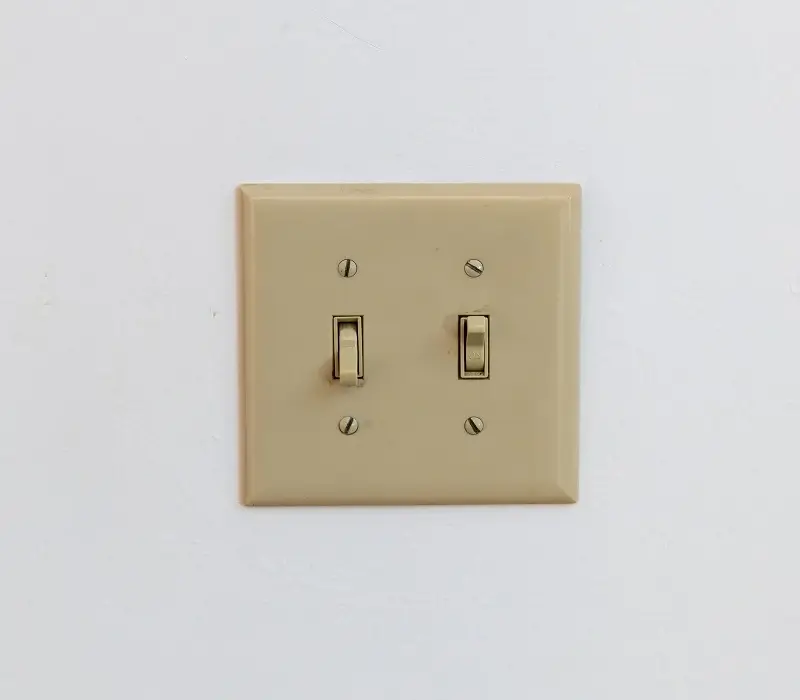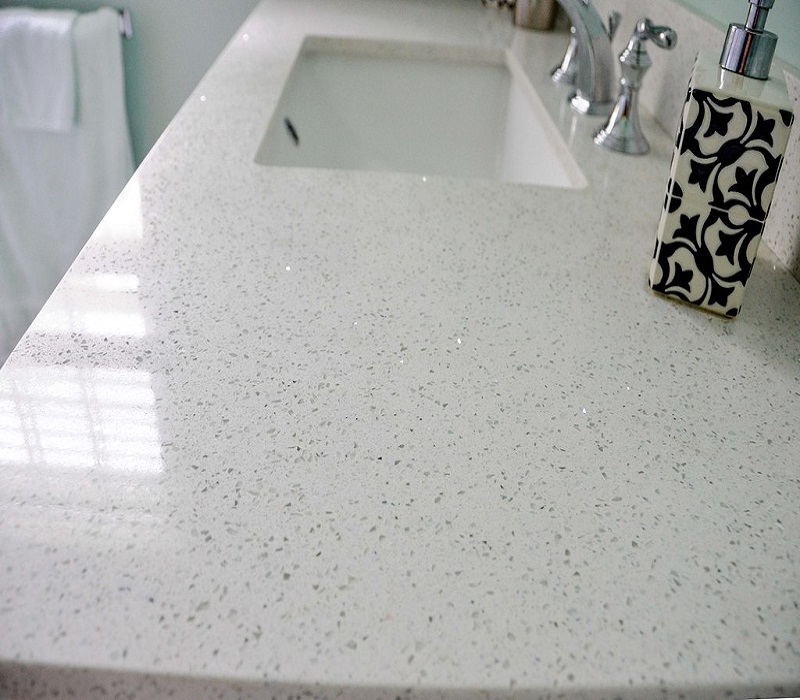
Quartz countertops are an excellent, aesthetically pleasing choice. They are durable, visually stunning, and come in various colors. They also give a lovely sense of elegance to the kitchen. However, a small stain on this piece of art can decrease its attractiveness. This can be caused by a new ingredient in your recipes, an excess amount of a specific detergent, or rust. Now we will discuss how to remove rust stains from quartz countertops.
Rust on countertops is a typical issue, often caused by old kitchenware. While the rust stain is simple to remove, you cannot just throw any cleanser you have on your hands. Quartz countertops are sensitive to high-pH detergents and low-acidifying chemicals; thus, using either can cause damage.
As a result, it is our responsibility to show you the products recommended by quartz professionals to clean your countertop. However, please check the vendor’s warranty information to see which products you can use and which would void the warranty.
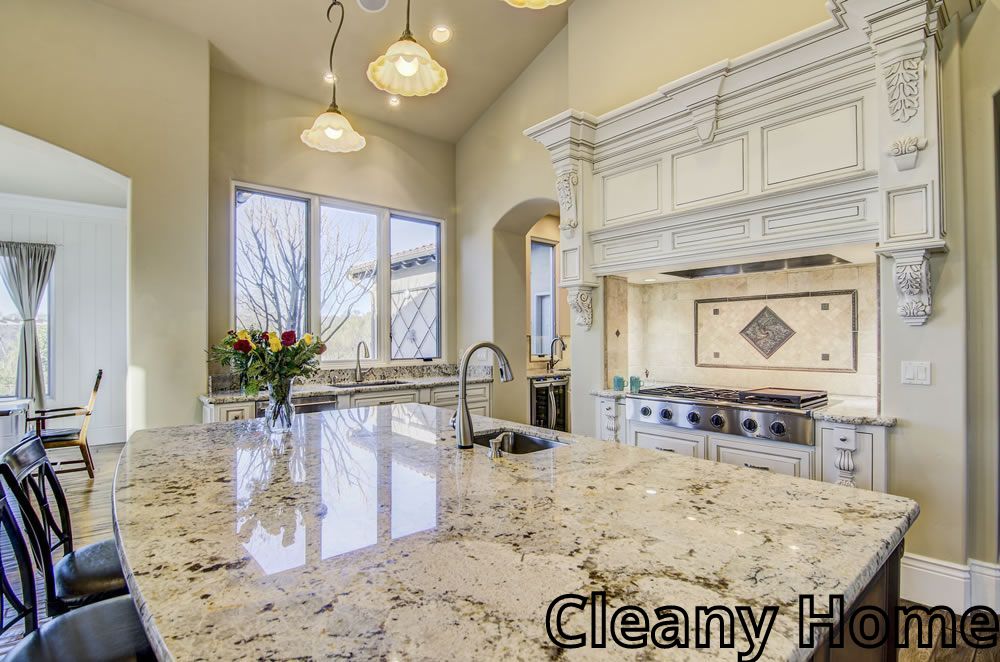
Table of Contents
How Does Quartz Countertops Get Rust Stains
Quartz countertops are highly resistant to staining, but they can develop rust stains in certain circumstances. Rust stains on quartz countertops typically occur due to the presence of iron oxide, which can come from a variety of sources, such as:
- Metal Objects: Leaving metal objects such as cast iron pans, knives, and utensils for a prolonged period on a quartz countertop can lead to rust formation. The rust from the metal object can transfer onto the countertop, resulting in stains.
- Water: Water with a high iron content can also lead to rust stains. If water containing iron is left to sit on a quartz countertop, the iron can react with the quartz, causing rust to form.
- Cleaning Solutions: Using abrasive or acidic cleaners on quartz countertops can cause rust stains. These types of cleaners can corrode the surface of the quartz and cause iron to leach out of the countertop, leading to rust formation.
It’s essential to clean up any spills or stains immediately and avoid placing metal objects directly on the countertop to prevent rust stains on your quartz countertops. If rust stains do occur, there are several effective ways to remove them, including using a mixture of baking soda and water or a commercial rust remover specifically designed for quartz countertops.
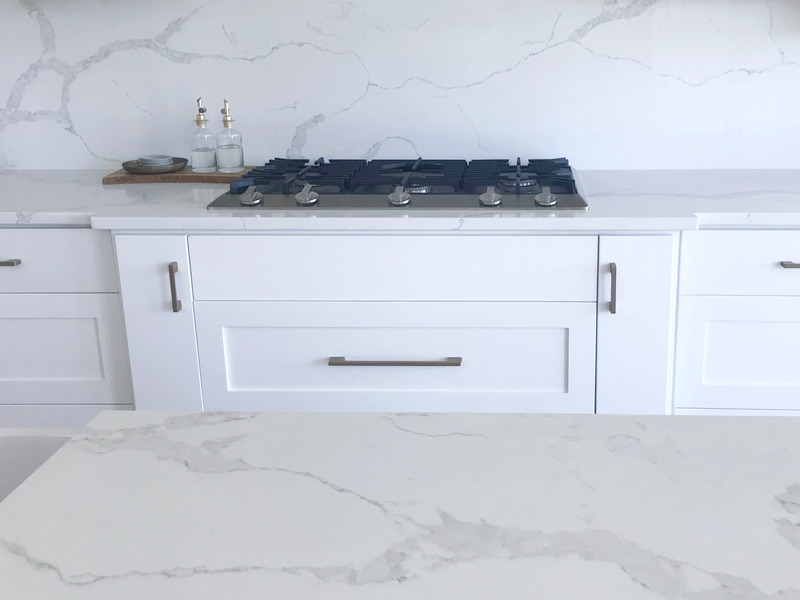
How to Remove Rust Stains from Quartz Countertops
Bar Keepers Friend

BKR is a wonderful product that has allowed us to get rid of plenty of stains. It’s simple to use, affordable and provides excellent results in a short period of time. However, since there are some abrasive versions of this product, make sure you have the right one: Bar Keepers Friend Granite & Stone Cleaner & Polish, which is available on Amazon.
Once you have the right one on hand, spray the discolored area and rub it using a soft cloth to avoid scratching your countertop. Also, since this product is safe for quartz, you can repeat the cleaning operation in case the first application didn’t completely remove the rust stain.
Magic Eraser

Another simple but efficient approach is by going with Magic Eraser. These little yet effective sponges perform wonders on various stains, including those caused by rust.
To begin, dampen the sponge and gently rub the stain. After that, thoroughly rinse your quartz countertop.
Lastly, dry the affected area with a clean towel, and voilà, your countertop should be sparkling once again.
Soft Scrub with Bleach

Many people might be scared of the idea of trying a Bleach-based product on quartz. Well, it’s understandable, given the potential harm this chemical may cause to quartz surfaces. Fortunately, there’s a way to take advantage of this product without harming your countertop. And it’s by going with Soft Scrub with Bleach.
This product is simple, effective, and recommended by Quartz countertops’ specialists themselves. All you need to do is to apply the cleaner to the discolored area and wipe it using a clean cloth.
You may need to use some elbow grease to remove the stain, but the results will be worth it. After removing the rust spot, properly clean your countertop to remove any leftover moisture.
If the first application does not completely remove the rust stain, repeat the procedure.
Please, however, do not leave the product on your countertop for an extended amount of time. In other words, right after applying it, dab it with a towel and wipe it off the surface.
Poultice

You can try using a poultice made from baking soda and water to help lift the rust stains. Here’s a step-by-step guide:
- Mix a paste: In a small bowl, combine baking soda and water to create a thick paste. Start with a 1:1 ratio and adjust as needed to achieve a paste-like consistency.
- Apply the poultice: Using a plastic or wooden spatula, spread the paste evenly over the rust stains on your quartz countertop. Make sure to cover the entire stained area with a layer of the paste, about 1/4 inch thick.
- Cover and let it sit: Place plastic wrap or a piece of cling film over the poultice to create a seal and prevent it from drying out. Allow the poultice to sit on the stains for at least 24 hours.
- Remove the poultice: After the designated time has passed, carefully remove the plastic wrap and allow the poultice to dry completely. As it dries, it should draw out the rust stains from the quartz surface.
- Gently scrub and rinse: Once the poultice is completely dry, use a soft-bristle brush or non-abrasive sponge to gently scrub away the dried poultice. Be cautious not to scrub too vigorously to avoid damaging the quartz. Rinse the area with clean water and wipe it dry.
- Repeat if necessary: Depending on the severity of the rust stains, you may need to repeat the process several times to achieve satisfactory results. Be patient and persistent, as removing rust stains from quartz can be a gradual process.
Baking Soda & Vinegar
Who said that do-it-yourself approaches don’t work on rust stains? If you’re accustomed to cleaning stains and spills on your own, you’re already familiar with how effective baking soda is.
In a bowl, combine enough baking soda and water to make a thick paste. Then, using a clean towel, apply the mixture to the affected area and rub it in.
Following that, thoroughly rinse your countertop to ensure no trace of the combination remains.

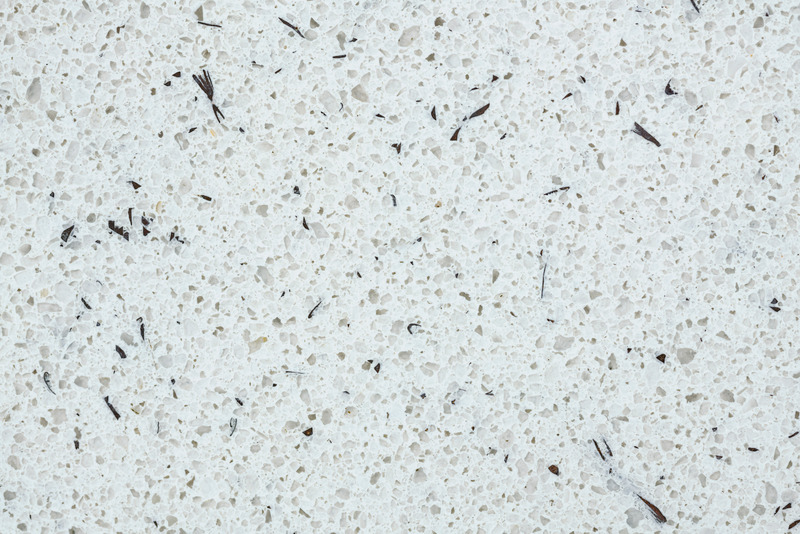
How to Prevent Rust from Staining your Quartz Countertop
Preventing rust from staining your quartz countertop is essential to maintain its pristine appearance. Here are some steps you can take to minimize the chances of rust stains:
- Wipe up spills promptly: Any spills that contain iron or can cause rust, such as water with high iron content or acidic liquids like citrus juice, should be wiped up immediately. Avoid allowing liquids to sit on the countertop for an extended period.
- Use coasters and trivets: Place coasters or mats under metal objects such as cans, bottles, utensils, and pots to prevent direct contact between the metal and the quartz surface. This will help reduce the risk of rust stains.
- Clean with non-abrasive materials: When cleaning your quartz countertop, use non-abrasive materials like a soft cloth or sponge. Avoid using abrasive scrubbers or steel wool, as they can scratch the surface and create areas where rust can accumulate.
- Use pH-neutral cleaners: Choose gentle, pH-neutral cleaners specifically formulated for quartz countertops. Avoid harsh chemicals and acidic substances that can damage the quartz and potentially promote rust formation.
- Avoid abrasive cleaners: Do not use abrasive cleaners or scouring powders on your quartz countertop, as they can scratch the surface and make it more susceptible to staining.
- Seal the countertop (if applicable): Some quartz countertops come pre-sealed, while others may require periodic sealing. If your countertop needs sealing, follow the manufacturer’s instructions or consult with a professional to ensure you apply the appropriate sealant. Sealing helps create a protective barrier that can reduce the chances of rust stains.
- Regular maintenance: Perform regular cleaning and maintenance on your quartz countertop to keep it in optimal condition. This includes routine wiping, cleaning up spills promptly, and maintaining a regular cleaning schedule using suitable products.
By following these preventive measures, you can significantly reduce the risk of rust stains on your quartz countertop and keep it looking its best for years to come. Remember to always refer to the manufacturer’s guidelines for specific cleaning and maintenance recommendations for your particular quartz countertop.
Conclusion
We hope the products mentioned above have assisted you in removing the rust stain off your quartz countertop. If you eventually want to try a different product, please make sure it’s safe to use on your quartz countertop. Otherwise, we recommend contacting the manufacturer/installer or testing it on an inconspicuous part of the countertop.
If you want to avoid rust on your quartz countertop, here are some tips. Rust on kitchen counters is often the consequence of rusted kitchenware. As a result, we urge that you regularly examine all of them, particularly the older ones.
Additionally, this problem can also be caused by rusty tap water, which is often due to water main breaks, heater issues, or corroding metal pipes.
Lastly, please leave us your feedback regarding the abovementioned approaches. You can also visit our recent guide on removing Vaseline from a fabric couch in case you use this product.
How do you get rust out of quartz countertops?
To remove rust stains from quartz countertops, make a paste of baking soda and water, apply it to the stain, and let it sit for 10-15 minutes. Then, use a soft-bristled brush or cloth to gently scrub the area, and rinse with water. If the stain is still there, repeat the process or use a commercial rust remover that is safe for use on quartz surfaces. Avoid using abrasive scrubbers or harsh chemicals that could damage the quartz.
Does baking soda remove stains from quartz?
Baking soda is a mild abrasive and can be used to remove stains from quartz countertops. To use baking soda to remove stains, make a paste of baking soda and water, apply it to the stain, and let it sit for 10-15 minutes. Then, use a soft-bristled brush or cloth to gently scrub the area, and rinse with water.
How do you remove metal marks from quartz?
To remove metal marks from quartz, first try using a non-abrasive cleaner specifically designed for quartz countertops. If that doesn’t work, you can try using a paste made from baking soda and water. Apply the paste to the metal mark and let it sit for several minutes. Then, use a soft-bristled brush or cloth to gently scrub the area, and rinse with water. Be sure to avoid using abrasive scrubbers or harsh chemicals that could damage the quartz.
Does vinegar damage quartz?
Quartz is generally resistant to most household acids and bases, including vinegar. However, it’s still recommended to avoid using vinegar on quartz as a regular cleaner, as it can potentially cause damage to the surface over time. Instead, it’s best to use a cleaner specifically designed for quartz countertops.
Can stains be removed from quartz?
Yes, stains can be removed from quartz. The method for removing a stain depends on the type of stain and the severity of the stain. For example, a gentle cleanser and soft-bristled brush can remove mild stains from quartz. For tougher stains, you may need to use a mixture of baking soda and water, or a specialized quartz stain remover.
We're an affiliate
We hope you love the products we recommend! Just so you know, CleanyHome.com is a participant in the Amazon Services LLC Associates Program, an affiliate advertising program designed to provide a means for sites to earn advertising fees by linking to Amazon.com.

![How to Get Rid of Spiders in the Basement [9 Effective Tips]](https://supercleanworldall.com/wp-content/uploads/2021/07/depositphotos_125531742-stock-illustration-the-pattern-with-spiders.jpg)
